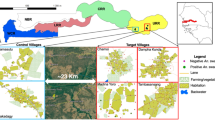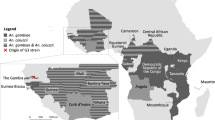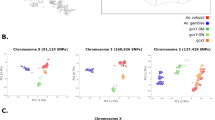Abstract
THE existence of two fresh-water forms (A and B) of Anopheles gambiae Giles which, when crossed, produce sterile F1 males has been established by Davidson and Jackson1. A salt-water tolerant strain of the same species from near Tanga, Tanganyika, has been shown to be partially incompatible with two strains of the group A fresh-water form2,3, while the variety melas has been shown to be incompatible with a fresh-water form (group unknown) from a nearby area in Liberia4.
This is a preview of subscription content, access via your institution
Access options
Subscribe to this journal
Receive 51 print issues and online access
$199.00 per year
only $3.90 per issue
Buy this article
- Purchase on SpringerLink
- Instant access to the full article PDF.
USD 39.95
Prices may be subject to local taxes which are calculated during checkout
Similar content being viewed by others
References
Davidson, G., and Jackson, C. E., Bull. World Health Org., 27, 303 (1962).
Ann. Rep. East Afr. Inst. Malaria and Vector-Borne Diseases (East Africa High Commission, Nairobi, Kenya, 1960).
Patterson, H. E., Nature, 195, 469 (1962).
Ann. Rep. Liberian Inst. Amer. Found. Trop. Med. (Harbel, Liberia, 1960).
Baker, R. H., French, W. L., and Kitzmiller, J. B., Mosquito News, 22, 16 (1962).
Author information
Authors and Affiliations
Rights and permissions
About this article
Cite this article
DAVIDSON, G. Anopheles gambiae Complex. Nature 196, 907 (1962). https://doi.org/10.1038/196907a0
Issue date:
DOI: https://doi.org/10.1038/196907a0
This article is cited by
-
Deep learning and wing interferential patterns identify Anopheles species and discriminate amongst Gambiae complex species
Scientific Reports (2023)
-
Systematic identification of plausible pathways to potential harm via problem formulation for investigational releases of a population suppression gene drive to control the human malaria vector Anopheles gambiae in West Africa
Malaria Journal (2021)
-
A new species in the major malaria vector complex sheds light on reticulated species evolution
Scientific Reports (2019)
-
Mario Coluzzi (1938–2012)
Malaria Journal (2014)
-
Records of the Breeding of ‘Saltwater Anopheles gambiae’ at Inland Localities in Southern Africa
Nature (1964)



